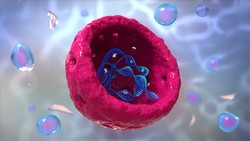The molecular link between cell growth and cell cycle
The nucleolus is a nuclear structure associated with the transcription of ribosomal RNA and production of ribosomes – the protein-synthesising machinery. Accumulating evidence indicates a role for nucleolus in the interconnection between cell growth and cell cycle by transmitting cell growth defects to cell cycle regulators. The scope of the EU-funded ND8-NOS (The role of the ubiquitin-like molecule NEDD8 in nucleolar signalling) project was to delineate the precise mechanism and the implication of ubiquitin and ubiquitin-like proteins. Previous work by the consortium revealed that the ubiquitin-like protein NEDD8 regulates the coordination between cell growth and cell cycle. They had found that NEDD8 was covalently attached to ribosomal proteins facilitating their correct localisation in the nucleolus for normal cell growth. During ND8-NOS, scientists wished to extend their findings regarding the role of NEDD8 with respect to the organisation of the nucleolar proteome and function. To achieve this, researchers inhibited the NEDD8 pathway using a small molecule (MLN4924), which is currently undergoing clinical testing. Then they employed quantitative mass-spectrometry and microscopy to determine the proteomic and morphological changes in the nucleolus following NEDD8 inhibition. They observed alterations in nucleolar morphology and nucleolar protein distribution that can activate the p53 tumour suppressor and cause cell cycle arrest. Subsequent studies in C.elegans validated an evolutionarily conserved role for NEDD8 function in the control of nucleolar morphology and cell cycle regulation. Considering that post-translational modifications of proteins with ubiquitin and ubiquitin-like molecules are key mechanisms of protein function regulation, the results of the ND8-NOS study have important consequences. These pathways are now targets for therapeutic intervention for diseases such as cancer.







